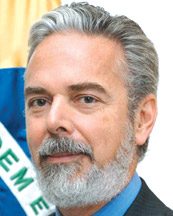Diplomacy and the protection of civilians
by Antonio de Aguiar Patriota
The protection of unarmed civilians in conflict situations is a moral
and diplomatic challenge. Killed, wounded and displaced civilians cannot
be treated merely as "collateral effects". The issue requires the
international community to take on its collective responsibility.
 The growing importance of the subject has led the South Korean
Presidency of the United Nations Security Council (UNSC) to hold a
debate, at ministerial level, in which I took part on February 12 this
year. The growing importance of the subject has led the South Korean
Presidency of the United Nations Security Council (UNSC) to hold a
debate, at ministerial level, in which I took part on February 12 this
year.
As a starting point we must keep in mind that prevention of conflicts
is the best way to ensure the protection of civilians.
A lot is said about the unacceptability of situations in which
governments do not protect their own populations. Today there is an
international consensus about the need for coordinated efforts to face
such circumstances.
It must be recognised, however, that the international community has
failed to take heed of fundamental issues for the protection of
civilians, among which the following stand out:
1) The promotion of sustainable development with a focus on poverty
eradication and on food security contributes to the promotion of peace.
The lack of opportunities and perspectives is the seed of conflicts,
encourages radicalism and weakens faith in institutions.
It is regrettable that there are such high military expenditures,
while the Official Development Assistance goals agreed in Monterrey in
2002 have still not been met;
2) We must fight to reduce the availability of instruments of
violence, particularly weapons of mass destruction. It is indispensable
to progress on disarmament and non-proliferation. The ease with which
conventional weapons can be obtained, particularly through illegal
trade, multiplies the damages caused by conflicts. The consequences for
civilians of the indiscriminate use of technological innovations in the
fight against insurgencies or terrorism, in turn, require a deeper
debate;
3) We cannot forget the responsibility of the international community
for the paralyzation of the Israel-Palestine peace process and the
failure of the Quartet in contributing to an agreement. Unilateral
measures are exacerbating tensions in the region. The Security Council
must act decisively on this issue.
The vulnerability of the civilian population in the occupied
territories represents a situation of high risk, whose dangers must not
be underestimated; and
4) The paralysis in issues of international peace and security can be
considered the most worrisome example of the stagnation of the global
governance system.
The United Nations Security Council, frozen in an obsolete
configuration of power, is the forum that debates and can authorise the
use of force for the protection of civilians.
A more legitimate and representative UNSC will dispose of better
conditions to implement preventive measures and diplomatic strategies
that can avoid radicalisation and solve conflicts.
We recognise that in some cases the international community will not
be able to prevent, by diplomatic means, armed conflicts causing massive
violations of the civilian population's human rights.
Nevertheless, all peaceful means to minimise the impact on civilians
must be exhausted.
The use of force always brings with it the risk of killings and of
the dissemination of violence and instability.
The military interventions in Afghanistan and Iraq created a high
number of civilian casualties (conservative estimates put the numbers at
approximately 120,000 deaths from September 2001 to September 2012), in
addition to refugees and internally displaced persons (approximately 1.6
million only in Iraq). Northern Africa is experiencing the destabilizing
effect of the actions taken in Libya.
These lessons cannot be ignored. In the exceptional and extreme
situations in which the Security Council might authorize the use of
force for the protection of civilians, it is necessary to ensure that
the military intervention is judicious, proportional, and strictly
limited to the objectives established by the UN.
In this context, we must ensure that:
1. The intervention is inserted in a diplomatic strategy for the
resolution of the conflict. In other words, an intervention cannot be an
end in itself;
2. A minimum of violence and instability is generated, therefore
avoiding even greater harm to the civilian population; and
3. The UN adopts and observes clear procedures for the monitoring and
assessment of the manner in which its resolutions are interpreted and
applied. Prevention of conflicts and the peaceful resolution of disputes
minimizes the suffering of civilians.
When military intervention is authorised and considered potentially
beneficial, the responsibility to protect must be accompanied by
responsibility while protecting.
Multilateral efforts for the protection of civilians must be anchored
in the respect for human rights and International Humanitarian Law,
including in the context of the fight against terrorism.
Lately, use of the phrase "there is no military solution for..." can
be increasingly noticed. President Dilma Rousseff, in her statement to
the General Debate of the 67th General Assembly of the UN, declared that
"there is no military solution to the crisis in Syria". It is the
perception of this fact that makes a diplomatic platform for Syria, such
as the one proposed by the 2012 Geneva Action Group, so urgent and
necessary.
In his inauguration speech in January, The President of the United
States Barack Obama stated that "enduring security and lasting peace do
not require perpetual war".
With the end of the unipolar moment and the beginning of the
formation of a multipolar order, the certainty that there is no military
solution for the vast majority of peace and security problems in the
contemporary world has begun to take shape. We must see this development
as new leeway for multilateralism and for a more relevant role for
diplomacy. "
The writer is the Minister of External Relations of the Federative
Republic of Brazil |



